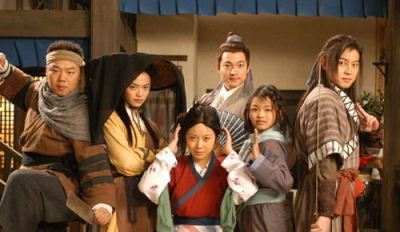Sitcoms in China are having a hard time succeeding or getting recognized, compared to Western sitcoms (situational comedies) such as “The Big Bang Theory” or “Modern Family” which often win awards, the Global Times reported.
At the 10th anniversary of the first episode of the TV series "My Own Swordsman" this January, many people have come to realize how only a few Chinese sitcoms are truly influential.
According to the report, the lack of successful sitcoms shows the dilemma that comedy faces in the country, not to mention that the sitcom format first appeared on mainland TV only in 1994 and the genre is considered young compared in the U.S. or the U.K.
Because sitcoms in China are restricted in their ability to deal with certain subjects, they lack the needed push to make them truly effective, the report said.
During the early 1990s, Ying Da, a multi-talented director and actor with a master's degree at the University of Missouri in the U.S., tried to import sitcoms to China. During that time, the dubbed version of U.S. sitcom "Growing Pains" (1985-92) was having a great success on Shanghai TV, showing that there was certainly a potential audience for Chinese-made sitcoms in the country.
Ying, together with the late scriptwriter Liang Zuo, started working on "I Love My Family," a sitcom about a family of six in Beijing who each had their own distinct backgrounds. To get real laughter to accompany the performances, Ying filmed the sitcom in front of a live studio audience. No other sitcom in China ever did the same, except for Ying's other work, "Chinese Restaurant."
Although "I Love My Family" is commonly recognized as one of the top sitcoms in China, it received a lot of criticism when it first appeared on TV in 1994, that it stopped airing after six episodes because some audiences said it was making fun of retired officials.
When audiences finally got used to its humor, the show not only became popular but it also started the sitcom genre in China. In 1994, Ying created a number of "Ying-style" sitcoms (aside from "Chinese Restaurant") such as "Xianren Madajie" (2000), "Dongbei Yijiaren" (2001) and "The Railway Station" (2002). Filmbug.com describes Ying as the "Norman Lear of China" for his contributions.
Former general manager of Ying's studio Wang Xiaojing said in an interview with the Beijing Daily that most of the sitcoms were not huge money-makers.
"In China, sitcoms barely had a future. Audiences found them too low-brow, while TV stations weren't willing to pay high prices for them. In that case, who was willing to make them?" Wang said.
Two decades after the first broadcast of "I Love My Family," Ying said that its success may be attributed to its willingness to be critical of social realities in China, which he noted modern comedies lack.
"When we write comedy nowadays, we go soft so we won't hurt anybody. But how can a comedy go without hurting someone?" Ying said.
In 2006, "My Own Swordsman" gave the genre a new and fresh start, the report said. The sitcom was a rare period sitcom which solved problems with comedy and not with violence. It also incorporated modern elements with the ancient world.
After "My Own Swordsman," the most popular sitcom was the "iPartment" series, which started in 2009. The series also launched the careers of its performers.
As Chinese audiences are looking for better work, having seen excellent dramas from the U.S. and the U.K., scriptwriters are now pressured to step up their storytelling.



























